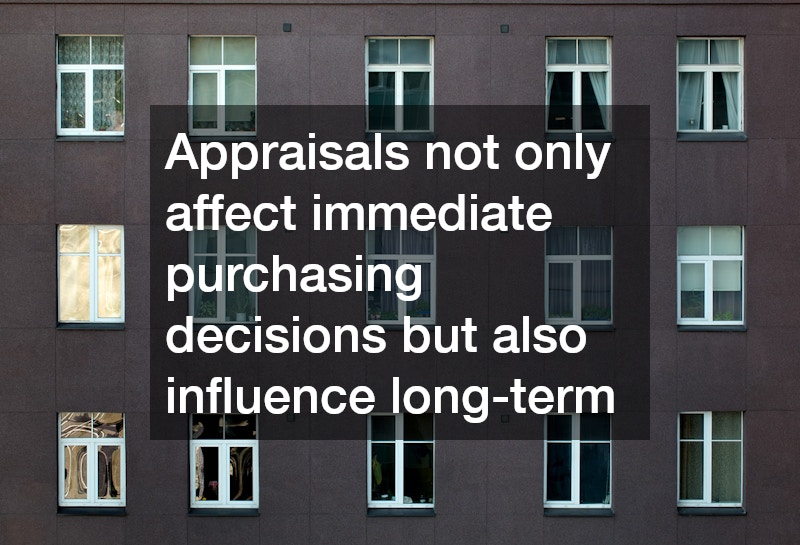Apartment building appraisals play a pivotal role in real estate investment, providing essential valuations that guide buying, selling, and refinancing decisions. The appraisal process involves a detailed evaluation by a licensed professional who assesses a property’s market value based on various factors. Investors rely on these appraisals to make informed decisions, aiming to maximize returns while minimizing risks in the ever-evolving real estate market.
Understanding the intricacies is crucial for anyone involved in real estate investment. They offer a snapshot of a property’s worth, which can influence the direction and success of an investment strategy. Accurate appraisals help investors to align their financial plans with market realities, ensuring that their strategies are built on solid ground.
Appraisals provide insights into a property’s current condition and potential future value, making them essential for strategic planning. By offering a comprehensive analysis, they can indicate whether an investment is likely to appreciate or depreciate over time. In this way, apartment building appraisals serve as a roadmap, guiding investors toward profitable opportunities and away from potential pitfalls.
The Process
The appraisal process begins with a thorough assessment of the apartment building, focusing on both internal and external factors. Appraisers evaluate the condition of the building, amenities, location, and recent comparable sales in the area. This comprehensive analysis helps determine the property’s market value, which is a critical component of any investment strategy.
Physical inspections and analysis of financial documents are part of the detailed process an appraiser follows. They also consider factors such as zoning laws, rental income potential, and neighborhood developments. Each element is crucial for determining an accurate and fair market value that investors can rely on for making strategic decisions.
The process is designed to be objective, ensuring that the resulting appraisal reflects the true market conditions. Since these valuations can significantly influence investment decisions, it’s vital that appraisers maintain accuracy and impartiality throughout the assessment. Investors impacted by apartment building appraisals need confidence in the process to trust in its outcomes as they shape their investment strategies.
Impact on Investment Strategies
Apartment building appraisals directly impact investment strategies by influencing financing options and potential returns. Investors often use appraisals to negotiate favorable terms with lenders, who require accurate property valuations to assess loan risks. The appraisal affects not only the purchase or sale price but also the financing terms, which can alter the overall cost and return on investment.
For long-term strategies, an accurate appraisal helps forecast potential income and expenses, providing a clearer picture of future profitability. It enables investors to identify underperforming properties and evaluate options for increasing value, such as renovations or improved management. Moreover, understanding the evaluated market value helps investors set realistic price expectations and plan exits or expansions within their portfolio.
Appraisals also aid in risk management by offering a third-party perspective on a property’s value. This evaluation can uncover hidden issues or mispriced assets, allowing investors to adjust their strategies accordingly. Ultimately, apartment building appraisals are fundamental tools in crafting investment strategies that are responsive and resilient to market dynamics.
Factors
Several factors can affect apartment building appraisals, such as location, market trends, and building condition. High-demand neighborhoods usually lead to higher appraisals due to their attractiveness and potential for continued growth. Market trends, like shifts in rental demand or economic changes, also play a significant role as they directly impact a building’s perceived value.
The building’s condition, including age, quality of construction, and maintenance, can significantly influence its appraised value. Well-maintained properties generally command higher valuations, while those requiring extensive repairs may see their worth decline. Appraisers must account for these conditions along with potential renovation costs when determining market value.
Lastly, external factors such as regulations, tax policies, and upcoming infrastructure projects can influence appraisals. For instance, changes in zoning laws might increase a property’s future potential, while new developments could alter neighborhood dynamics. Investors must consider these variables when evaluating how apartment building appraisals will impact their strategies.
Apartment building appraisals are indispensable tools in forming and adjusting investment strategies. They provide crucial insights into a property’s current and potential value, paving the way for informed decision-making. By understanding and leveraging the appraisal process, investors can better navigate the complexities of the real estate market to maximize their returns.
Strategic investors recognize the value of accurate appraisals as they shape financing decisions, negotiate deals, and assess risk. The detailed information supplied through appraisals supports robust planning, offering a solid foundation for managing and expanding real estate investments. Staying informed and aligning strategies with appraisal insights can help investors thrive even amidst market fluctuations.
Appraisals not only affect immediate purchasing decisions but also influence long-term strategic planning. By embracing the insights they provide, investors can ensure their real estate investments are well-aligned with market realities. In this way, apartment building appraisals act as vital instruments for achieving success in the dynamic world of real estate investing.





